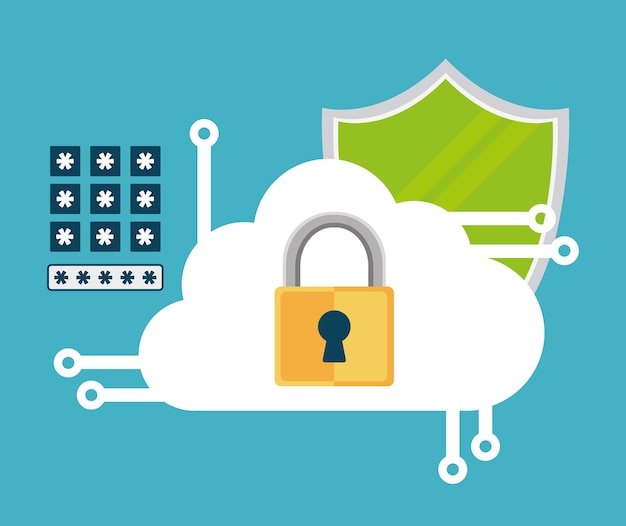Top 8 Cloud Storage Solutions for US Users: 2025 Pricing & Features

Top 8 Cloud Storage Solutions for US Users: Pricing and Features Compared (2025) offers a detailed comparison of leading cloud storage services, examining their pricing structures, features, and suitability for various user needs in the United States.
Navigating the world of cloud storage can be overwhelming, especially when you’re looking for the best fit for your needs in the US market. This article provides a comprehensive overview of the Top 8 Cloud Storage Solutions for US Users: Pricing and Features Compared (2025), helping you make an informed decision.
Choosing the Right Cloud Storage: Key Considerations for US Users
Selecting the ideal cloud storage solution involves evaluating several critical factors. This section highlights the essential elements US users should consider before making a decision, ensuring the chosen service aligns with their specific requirements.
Data Security and Privacy
Prioritize providers with robust security measures, including encryption and two-factor authentication, to protect sensitive data. Also, review their privacy policies to understand how your data is handled and stored.
Storage Capacity and Scalability
Assess your current and future storage needs to choose a plan that offers sufficient space and allows for easy scalability as your data grows.
Pricing Plans and Value
Compare the pricing structures of different providers, considering both upfront costs and long-term value, to find a plan that fits your budget and offers the features you need.
- Encryption: Opt for services that offer end-to-end encryption for maximum data security.
- Compliance: Ensure the provider complies with relevant US data protection regulations, such as HIPAA or GDPR.
- User Reviews: Research user reviews and ratings to gain insights into the provider’s reliability and customer satisfaction.
In conclusion, thoroughly assessing security, storage capacity, and pricing is crucial for selecting the right cloud storage solution. By carefully considering these factors, US users can find a service that meets their needs and provides peace of mind.

#1: Google Drive – Seamless Integration for Google Ecosystem Users
Google Drive remains a popular choice for many US users due to its seamless integration with other Google services and its user-friendly interface. This section delves into the specifics of Google Drive’s offerings, pricing, and features.
Google Drive offers a range of features including file sharing, real-time collaboration through Google Docs, Sheets, and Slides, and automatic backups. Its intuitive interface makes it easy to use, even for those new to cloud storage.
Pricing and Storage Options
Google Drive provides 15GB of free storage shared across Google services. Additional storage is available through Google One, with plans starting at $1.99 per month for 100GB. The pricing scales up to 2TB for $9.99 per month, making it competitive in the market.
Key Features
The ability to seamlessly collaborate on documents in real-time is a standout feature. Google Drive also offers robust search capabilities, powered by Google’s search technology, making it easy to find specific files.
Google Drive’s strengths lie in its integration with the Google ecosystem, its collaborative features, and its competitive pricing. However, users prioritizing maximum privacy might consider alternatives with stronger encryption options.
#2: Microsoft OneDrive – Best for Microsoft 365 Subscribers
Microsoft OneDrive is tightly integrated with Microsoft 365, making it an attractive option for users already invested in the Microsoft ecosystem. This section examines OneDrive’s features, pricing, and how it compares to other cloud storage solutions.
OneDrive provides a seamless experience for Microsoft users, allowing easy access to files across devices. It excels in document collaboration and offers robust version history features.
Pricing and Plans
OneDrive offers 5GB of free storage, but its real value comes with a Microsoft 365 subscription. The Microsoft 365 Personal plan, which includes 1TB of OneDrive storage, costs $69.99 per year. Business plans offer even more storage and features.
Integration with Microsoft Office
OneDrive’s deep integration with Microsoft Office apps is a major advantage. Users can directly open, edit, and save documents from Word, Excel, and PowerPoint directly to OneDrive.
- Version History: Easily revert to previous versions of your files with OneDrive’s robust version history feature.
- Offline Access: Access your files even when you’re offline, with changes syncing once you regain internet connectivity.
- Personal Vault: Store sensitive files in a secure Personal Vault, protected by two-factor authentication.
In summary, OneDrive is an excellent choice for Microsoft 365 subscribers, offering seamless integration and robust features. However, users who don’t rely on Microsoft products may find other cloud storage solutions more appealing.
#3: Dropbox – Versatile and Widely Compatible Cloud Storage
Dropbox is a well-established cloud storage provider known for its versatility and compatibility across various operating systems. This section explores Dropbox’s key features, pricing, and why it remains a popular choice.
Dropbox offers a straightforward and reliable cloud storage experience, with a focus on file sharing and synchronization. Its cross-platform compatibility makes it a great option for users with diverse devices.

Pricing Structure
Dropbox offers 2GB of free storage, which is relatively limited compared to other providers. Paid plans start at $11.99 per month for 2TB of storage, making it a pricier option.
File Sharing and Collaboration
Dropbox excels in file sharing, allowing users to easily share files and folders with others, even if they don’t have a Dropbox account. It also offers basic collaboration tools, though they are not as robust as those found in Google Drive or OneDrive.
Dropbox stands out for its simplicity, reliability, and cross-platform compatibility. However, its limited free storage and higher pricing may deter some users. Individuals who frequently share files and need a dependable service may find value in Dropbox.
#4: iCloud – Seamless Integration for Apple Device Users
iCloud is Apple’s cloud storage service, designed for seamless integration with iPhones, iPads, and Macs. This section provides an overview of iCloud’s features, pricing, and benefits for Apple users.
iCloud provides a convenient way to store and synchronize data across Apple devices, including photos, contacts, and documents. Its integration with the Apple ecosystem is its primary strength.
Pricing and Storage Options
iCloud offers 5GB of free storage. Users can upgrade to iCloud+, with plans starting at $0.99 per month for 50GB. Other options include 200GB for $2.99 per month and 2TB for $9.99 per month.
Key Features for Apple Users
iCloud seamlessly integrates with Apple’s Photos app, allowing users to store and access their photos across all their devices. It also offers iCloud Drive, which functions as a cloud-based file system.
- Find My: Locate lost or stolen Apple devices using iCloud’s Find My feature.
- iCloud Keychain: Securely store passwords and credit card information with iCloud Keychain.
- Private Relay: Protect your online privacy with iCloud Private Relay, which encrypts your web browsing activity.
In conclusion, iCloud is a natural choice for Apple users, offering seamless integration and convenient features. However, its limited compatibility with non-Apple devices may make it less appealing to users with mixed ecosystems.
#5: Box – Enterprise-Focused Cloud Storage with Robust Security
Box is a cloud storage solution geared towards businesses, offering robust security features and collaboration tools. This section explores Box’s key features, pricing, and suitability for enterprise users.
Box focuses on providing secure and compliant cloud storage for businesses of all sizes. It offers advanced features like granular permissions, data loss prevention (DLP), and integration with enterprise applications.
Pricing and Plans for Businesses
Box offers a variety of business plans, starting at $15 per user per month for the Business plan, which includes 3 users minimum and 100 GB of storage. Higher-tiered plans offer more storage and advanced features.
Security and Compliance
Box prioritizes security and compliance, offering features like encryption, two-factor authentication, and compliance with industry regulations such as HIPAA and GDPR.
Box distinguishes itself with its emphasis on security, compliance, and enterprise-grade features. While it may be overkill for individual users, businesses seeking a secure and reliable cloud storage solution may find Box to be a valuable investment.
#6: pCloud – Secure and Private Cloud Storage
pCloud is known for prioritizing user privacy and security. It offers end-to-end encryption and stores data in multiple locations. This section examines pCloud’s key features and pricing.
pCloud offers a range of features, including file versioning, file sharing, and selective synchronization. It is designed for both personal and business use.
Pricing and Plans
pCloud offers a lifetime subscription option, giving users a one-time payment alternative to monthly or annual fees. Plans start with 500 GB, going up to several terabytes. Monthly subscriptions are also available.
Security Features
pCloud provides optional client-side encryption with pCloud Crypto. This security feature ensures that only the user can access their encrypted files.
pCloud is an excellent choice for users who value privacy and security. Its encryption, multiple storage locations, and lifetime subscription options provide good value.
#7: IDrive – Backup-Focused Cloud Storage
IDrive is known for its focus on backup services. IDrive allows you to back up multiple devices to a single account. This section explores its backup features and pricing.
IDrive’s offers several backup options, protecting multiple types of data from multiple sources. Integration is generally easy to use with an approachable interface.
Pricing and Plans
IDrive offers 5 GB of free storage. Several tiers of paid plans provide more storage. These plans are generally cheaper than other providers, giving IDrive value for price-conscious users.
Key Features
IDrive provides continuous data protection, and includes snapshot backups that allow you to schedule data to be saved at various points in time. This can be invaluable if something happens to your data.
IDrive may be an ideal solution for those who prioritize having reliable backups.
#8: SpiderOak – Highly Secure Cloud Storage Solutions
SpiderOak is known for focusing on security and privacy to a high degree. It’s a zero-knowledge service provider and focuses on giving users complete control of their data. This section explores SpiderOak’s security advantages.
SpiderOak encrypts data on the user end, so no one, including SpiderOak, can access the information. This can be appealing to high-security users. File sharing and other common cloud storage features can also be found here.
Pricing and Plans
Like other services, SpiderOak offers several tiers for users to choose from, based on how much storage is needed. Price points for each plan may be slightly higher than competitors, but may still be worth it. SpiderOak offers subscriptions with varied amounts of storage, starting from 150 GB.
Security
SpiderOak is secure and has several features that provide benefits to its users, depending on needs.
While not for everyone, as the top-tier encryption services may come at a price, those who need it may be happy with SpiderOak.
| Key Feature | Brief Description |
|---|---|
| 🔒 Security | Prioritize providers with encryption and two-factor authentication. |
| 💰 Pricing | Compare pricing structures and long-term value for your budget. |
| ⚙️ Integration | Evaluate how well the storage integrates with your existing tools. |
| 🛡️ Backup | Determine whether your backup needs are fulfilled by a cloud storage solution. |
Frequently Asked Questions
▼
Cloud storage saves digital data in off-site servers. Users can access their data from any device with the internet. Many cloud services are easy to use, and do not require technical knowledge.
▼
It depends on your standards for security, and what you want to protect. Some sources tout pCloud as having some of the best security features in the industry.
▼
Cloud storage costs vary depending on the amount of storage you need and the provider you choose. Most providers offer free options, but the storage is often limited. Shop around and consider your budget.
▼
Some cloud storage providers allow you to download files and access them offline. Once you are connected to the internet again, the files will resync automatically. Be sure to read specific documentation for your given provider.
▼
Yes, most cloud storage providers offer features and options such as the ability to create shareable links for certain items. These links can be distributed through a number of communication channels.
Conclusion
Choosing the right cloud storage solution depends on individual requirements, budget, and specific usage scenarios. US users can refer to this detailed comparison to choose an appropriate option for backing up data. Consider testing several providers if you’re unsure of which one is right for you.





